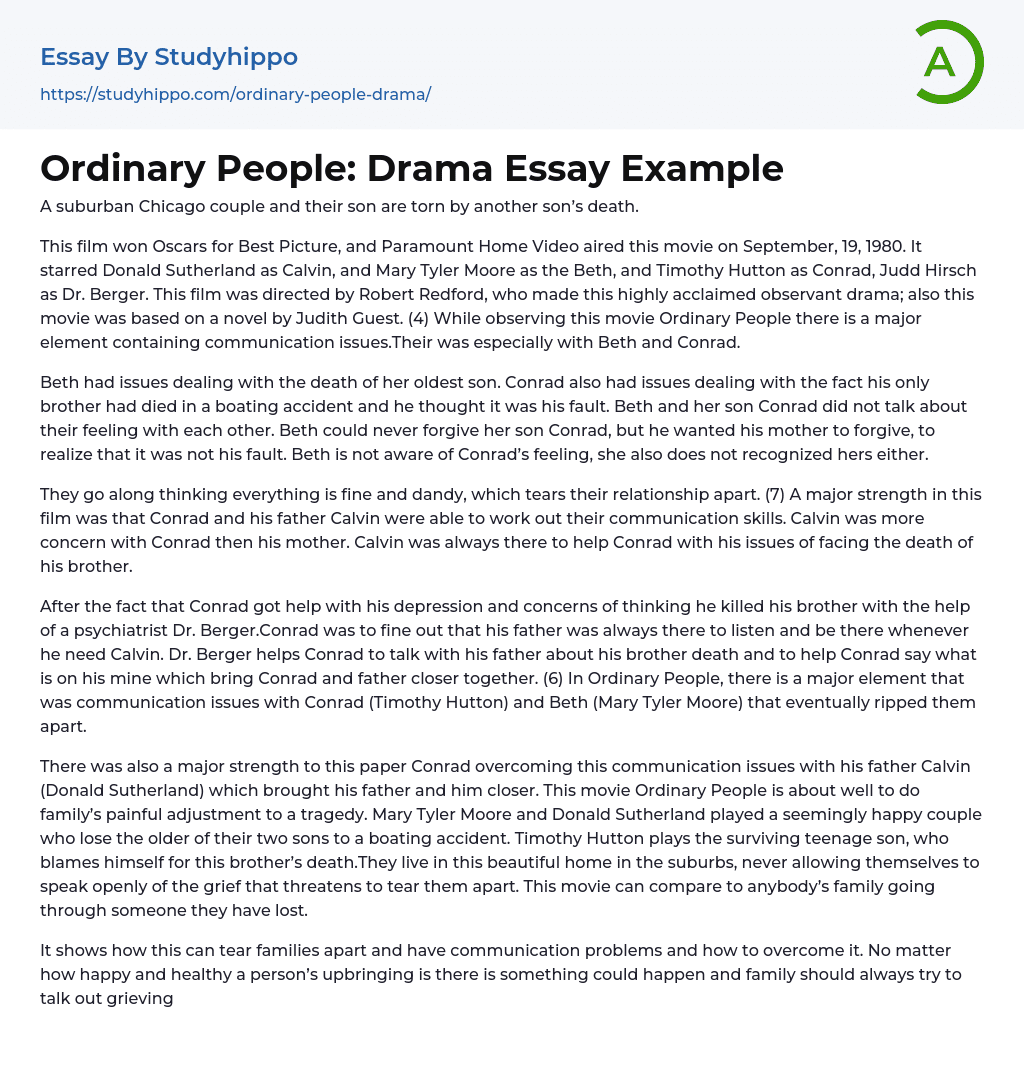The death of one son creates a heart-wrenching divide between a family in suburban Chicago.
This highly acclaimed observant drama called Ordinary People won Oscars for Best Picture. On September 19, 1980, Paramount Home Video aired the movie which was based on a novel by Judith Guest. The film was directed by Robert Redford and starred Donald Sutherland as Calvin, Mary Tyler Moore as Beth, Timothy Hutton as Conrad and Judd Hirsch as Dr. Berger. While watching the movie, one can note that a major element involves communication issues, particularly between Beth and Conrad. (4)
Beth and her son Conrad both experienced difficulty managing their emotions following the loss of Beth's eldest son and Conrad's sole sibling. Regrettably, they neglected to communicate with one another. Conrad felt responsible for his brother's fatal boating incident, whereas Beth was incapable of pardoning him. Although he desired empa
...thy and forgiveness from his mother, she failed to recognize his emotional condition as she grappled with identifying her own feelings.
The film effectively portrays the breakdown of a relationship caused by poor communication, highlighting the improvement of father-son communication between Conrad and Calvin. Unlike his mother, Calvin displays genuine concern for Conrad during his struggles with the loss of his brother, making him a consistent source of support throughout the movie.
After receiving assistance from psychiatrist Dr. Berger regarding his depression and concerns over possibly killing his brother, Conrad discovered that his father, Calvin, was always available to lend an ear. Dr. Berger facilitated a discussion between Conrad and Calvin regarding his brother's death that ultimately brought them closer together. In Ordinary People, communication problems between Timothy Hutton's character, Conrad, and Mar
Tyler Moore's character, Beth, led to their eventual separation.
Despite the communication challenges Conrad faced with his father Calvin (Donald Sutherland), this paper highlights how they overcame them and grew closer. The movie, Ordinary People, tells the painful story of a well-to-do family who struggle to adjust to a tragedy. Mary Tyler Moore and Donald Sutherland's characters portray a happy couple who lose their older son to a boating accident. Timothy Hutton plays their surviving teenage son, who blames himself for his brother's death. Despite living in a beautiful suburban home, the family avoids discussing their grief. This film is relatable to anyone who has lost a loved one.
The movie demonstrates the impact of communication difficulties on families, leading to separation and offering solutions for overcoming such issues. It highlights the significance of facing grief together as a family, irrespective of one's upbringing. This film holds relevance for individuals of various age groups who encounter difficulties while communicating with their loved ones. (10)
- 1984 essays
- A Farewell to Arms essays
- A Good Man Is Hard to Find essays
- A Hanging essays
- A Lesson Before Dying essays
- A Long Way Gone essays
- A Rose For Emily essays
- A Separate Peace essays
- A Tale Of Two Cities essays
- A Very Old Man With Enormous Wings essays
- Adventures Of Huckleberry Finn essays
- Alice in Wonderland essays
- All Quiet on The Western Front essays
- Allegory of the Cave essays
- An occurrence at owl creek bridge essays
- Animal Farm essays
- Anthem essays
- Antigone essays
- Arthur Conan Doyle essays
- As I Lay Dying essays
- Atticus Finch essays
- Barn Burning essays
- Battle Royal essays
- Beauty and The Beast essays
- Beloved essays
- Boo Radley essays
- Brave New World essays
- Candide essays
- Castle essays
- Characters In Hamlet essays
- Characters In Romeo And Juliet essays
- Christmas carol essays
- Chronicle of a Death Foretold essays
- Cinderella essays
- Crime and Punishment essays
- Daisy Miller essays
- Death of a Salesman American Dream essays
- Desdemona essays
- Diary Of A Wimpy Kid essays
- Dracula essays
- Dubliners essays
- Emma essays
- Ender'S Game essays
- Ethan Frome essays
- Eveline essays
- Fahrenheit 451 essays
- First-Person Narrative essays
- Fish Cheeks essays
- Frankenstein essays
- Genesis essays




